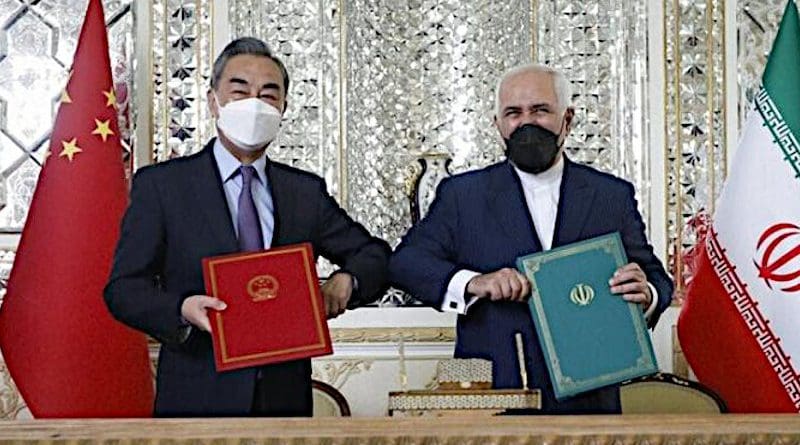Understanding China’s Relations With The Middle East – Analysis
By Andrea Ghiselli*
Over the past few years, China’s relations with the Middle East have come under the spotlight. Pundits and policymakers, such as General Kenneth F McKenzie Jr and Rush Doshi, have embraced power transition theory as the main framework to understand China–US relations. Following this framework, they expect China to become increasingly involved in the Middle East to protect its economic interests there and to establish its own sphere of influence to undermine the United States.
US efforts to disengage from the Middle East have fuelled anxiety about who will fill the power vacuum. The common assumption is that although Russia has played a much more prominent role since its 2015 intervention in Syria, superior economic power means China’s influence will steadily grow over time. Against this background, three elements ought to be kept in mind.
First, the Middle East occupies an awkward position in Chinese diplomacy. On the one hand, Beijing cannot ignore what happens there for reasons of energy security, terrorism, commercial interests and the centrality of Middle Eastern security issues in debates about sovereignty, intervention and relations among great powers. On the other hand, rising competition with the United States will force Beijing to concentrate its focus on Asia.
Anything that involves playing a more active role in the region poses substantial challenges to Chinese diplomacy. While China knows that its current limited involvement in regional issues undermines its capability to protect and further its interests, Chinese leaders are also acutely aware that changing this would risk opening a Pandora’s box at a moment when domestic and ‘Asian’ priorities demand great attention.
Second, the role of contingencies is also a key factor. The 2011 Libyan crisis, in which China evacuated about 36,000 of its citizens, provoked a dramatic change in the way China thinks about its interests overseas and the possible role that the military should play in protecting them. Research shows that such a change was far from inevitable. It was made possible by the combination of a significant external shock and the presence of top policymakers in China that were already pushing for a reconsideration of the idea of national security to include ‘development interests’ during the Hu Jintao administration.
Today, possible policy changes largely depend on whether another large-scale crisis takes place or not. While the COVID-19 pandemic has led to a significant decrease of the number of Chinese citizens overseas, China has been able to carry out a number of successful evacuations in the past decade thanks to better preparation and stronger cooperation with local partners. The chances that large-scale crises will take place have somehow diminished for the moment.
Chinese policymakers are less likely to see the need for urgent policy changes, especially in terms of larger or deeper involvement of the military, compared to in the past. It is important to avoid thinking that the militarisation of China’s approach to the protection of its interests in the region is inevitable or that it will eventually progress in a linear way.
Finally, the behaviour and strategies of regional actors are far from passive. They can adopt different strategies to secure the support of great powers, or to force them to do so. Given its permanent seat on the UN Security Council, its vast economic power and minimal engagement in regional rivalries, it is not surprising that China is seen as an ‘untapped resource’ by many policymakers in the region.
While China routinely warns against ‘playing the China card’, regional actors are already crafting new narratives that overplay the support that they receive from China. Syrian, Iranian and Lebanese media have described China as a strong supporter of their ‘axis of resistance and rejection’ in opposition to the United States, Israel and the Gulf monarchies. Such strategies may not to compel Chinese policymakers to provide or increase support to those countries. Yet, as tensions and misperception fuel each other, there are dangerous convergences between analogies and regional narratives inspired by World War II and the Cold War.
Looking ahead, it is difficult to tell if and how China’s role in the region will evolve. China’s approach to the Middle East is far more complex than what is usually discussed. It is being shaped by its own priorities, contingency and regional dynamics over which it has far less control than usually imagined. While scholars and analysts will have to keep their eyes open as they investigate the interaction of these factors, policymakers should avoid the mistake of seeing everything in terms of US-China rivalry.
*About the author: Andrea Ghiselli is Assistant Professor at the School of International Relations and Public Affairs, Fudan University, and Head of Research at the ChinaMed Project, part of the TOChina Hub. He is the author of Protecting China’s Interests Overseas: Securitization and Foreign Policy (Oxford University Press, 2021).
Source: This article was published by East Asia Forum

